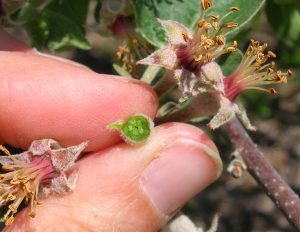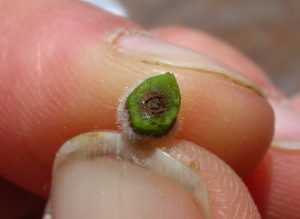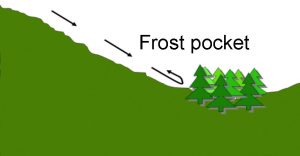Lack of Fruitfulness

Fruit trees fail to bear fruit for four general reasons: failure to form flowers, winter injury or frost damage to flower buds and flowers, lack of pollination, and insect damage to the fruits. Observations during bloom and early fruit growth enable us to determine which of these has caused the lack of fruitfulness.
Fruit trees will not bear fruit until they reach a particular age. The age at which a tree is able to bear fruit depends on the species, variety, and rootstock. Generally, apricot, cherry, peach and plum bear fruit more quickly than the apple and pear.
Apples are the most variable in how long it takes to reach bearing age because of the diversity of the rootstocks available. With dwarfing rootstocks, apples can bear fruit the year after they are planted. In contrast, they may not flower until seven years after planting when grafted on nondwarfing rootstocks. Some varieties of apple are slow to bear, such as Northern Spy.
Pears begin to bear flowers and fruit four to six years after planting, peaches in three years, tart cherry in three to five years, and sweet cherry in five to seven years. Sweet cherry will begin to bear a few years sooner when grafted on dwarfing rootstocks.
In apple, pear, and plum, failure to form flowers is also caused by biennial bearing. Biennial bearing is a condition in which the tree produces few flowers one year and a large number the following year. Biennial bearing is a complex phenomenon caused by the presence of fruit on the tree during the same time that next years’ flower buds begin to form. In summer, prior to the season in which they bloom, flowers form in the young developing buds. A large number of fruit at this time inhibits flower formation, and buds remain leafy instead.

Lack of sunlight and severe disease are additional reasons why trees fail to form flowers. Fruit trees need full sunlight, and will fail to produce flowers if planted in full shade. Severe outbreaks of disease, such as apple scab, cause defoliation, and without leaves, the tree does not have enough energy to form flowers. Damage to the leaves and defoliation leads to poor flowering the following spring.
Extremely cold temperatures kill flower buds, particularly those on cherry, plum, apricot, and peach trees. Following a cold winter, some or all of the flower buds may be dead even though the rest of the tree survived. Peach, apricot, and Asian plum flower buds are killed by temperatures below -18°F, but warm spells in winter can make buds more tender. Fluctuating temperatures in late winter and early spring can be more damaging to flower buds than severely cold temperatures in mid winter.

In spring when trees are in full bloom, flowers have lost all hardiness and are killed by temperatures below 28ºF. Avoid planting trees in low spots where air flow is poor since they can quickly become colder than areas at higher elevation or hill sides where air flow is greater. Cold air is heavier than warm air and will move down hillsides causing an inversion of warm and cold air. Woodlands and stands of trees also block airflow and create sites that are prone to spring freezes. Frost damage to flowers occurs frequently to apricot and cherry trees.
Poor pollination is a common cause for lack of fruit. Apple, apricot, pear, and plum need cross pollination by another variety in order for fruit to develop. Some varieties of sweet cherry also need cross pollination. Lack of cross pollination is the most common reason for lack of fruitfulness in plums. For more information, refer to the section “Pollination Requirements.”
Pollination depends on bees to transfer pollen from one flower to another. Many rural areas with pasture lands and abundant wild flowers have sufficient numbers of native bees for adequate pollination. However, like most insects, they are not active in poor weather. Cold temperatures or strong wind during the bloom period inhibits their activity. Consequently, there may be fewer fruit when bad weather occurs at bloom. Bees are the main pollinators of fruit trees, so insecticides should never be sprayed on blooming trees.
Soon after bloom, insects damage fruit causing many of the fruit to be shed. The plum curculio attacks developing apple, apricot, plum and cherry fruitlets. They also attack peach and pear, but to a lesser extent. Insect damage to fruitlets commonly occurs in unsprayed orchards.
